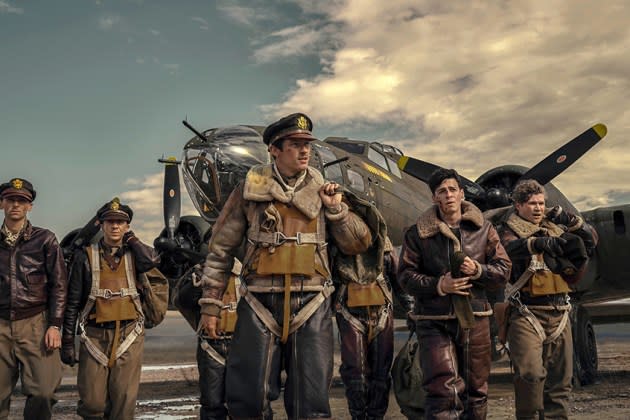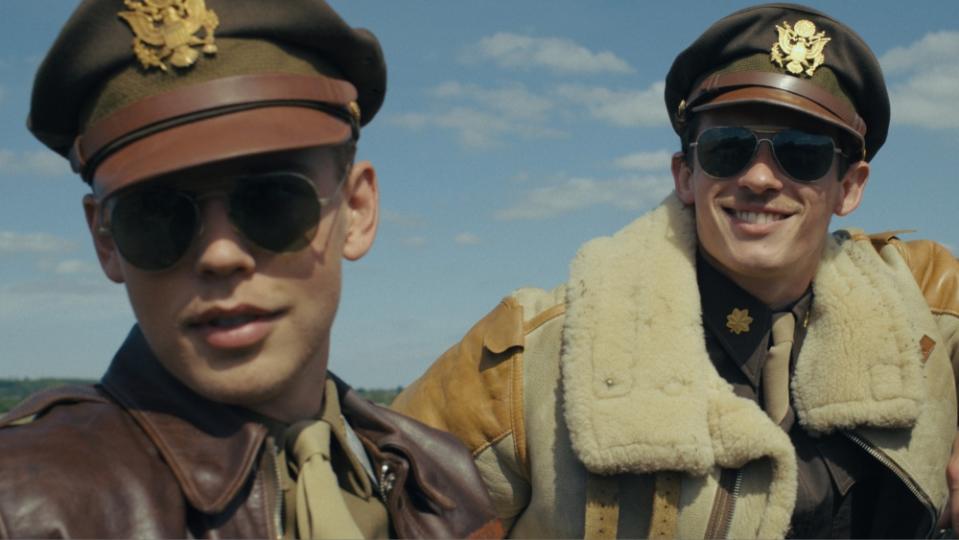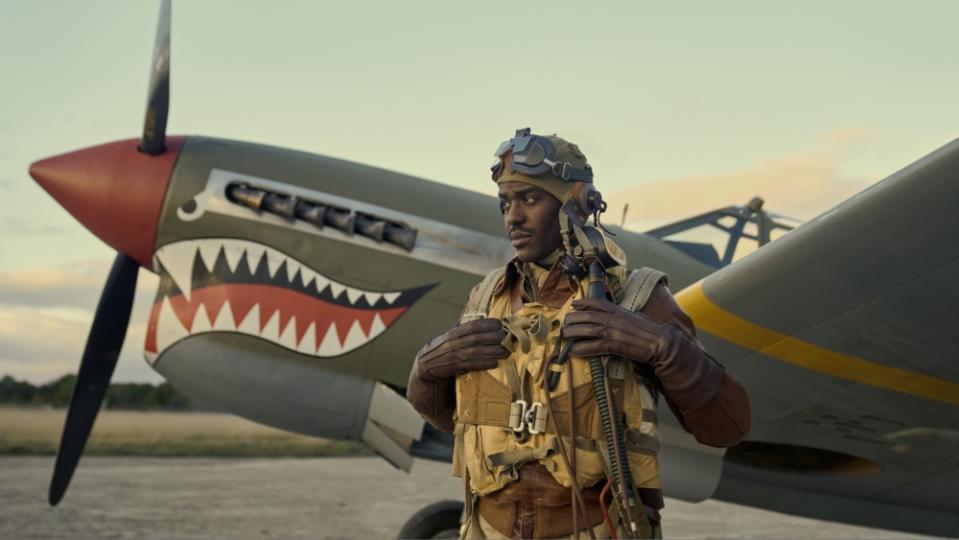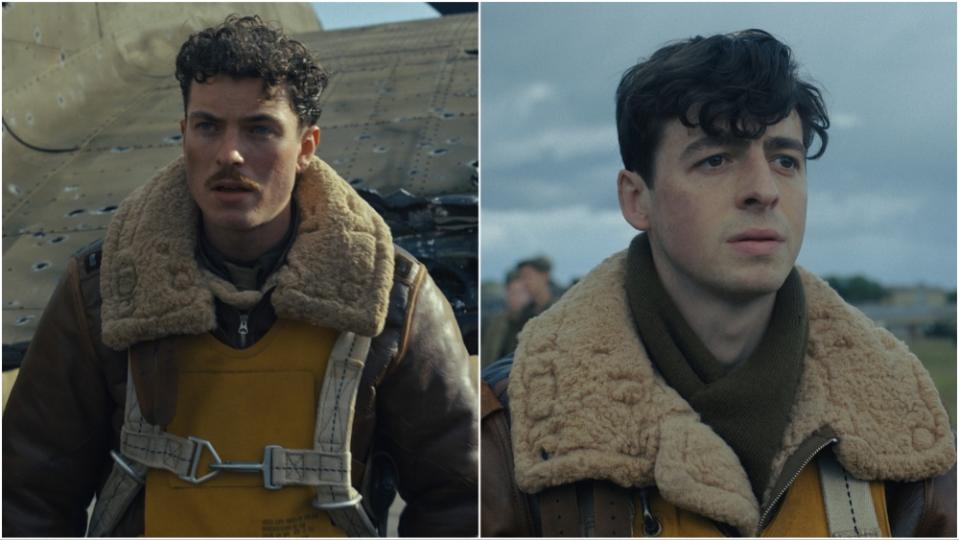‘Masters of the Air’ Writer John Orloff Compares Austin Butler and Callum Turner’s Characters to ‘Top Gun’: ‘They Were Maverick Before Maverick Existed’

“Masters of the Air” soared to become Apple TV+’s highest-watched series launch ever when the first episodes dropped in January. While it might seem like a no-brainer that the team behind “Band of Brothers” and “The Pacific” — including Steven Spielberg, Tom Hanks and Gary Goetzman — would hit it out of the park with a new World War II series, it wasn’t plain sailing, in large part thanks to COVID, which resulted in numerous delays. “It made the production very difficult,” Goetzman told Variety ahead of the series launch.
But also, in keeping with Apple TV+’s low-key publicity strategy, “Masters of the Air” somehow debuted on the streamer with minimal publicity, despite the fact that in the period between being pre- and post-production its key cast, including Austin Butler, Callum Turner, Barry Keoghan and Ncuti Gatwa had been propelled from jobbing actors to leading men.
More from Variety
Adding to its challenges, the show is not an easy watch, from its depiction of the anguish of losing beloved characters to the moral dilemmas posed by the story — and, of course, the mental workout of simply keeping up with such a vast and changing cast. And yet audiences have flocked to the series.
“Tom and Steven, one of their great gifts is choosing the right story to tell,” says writer and co-executive producer John Orloff about of Hanks and Spielberg’s decision to make a drama about the U.S. Air Force’s Hundredth Bomber group.
Ahead of the final episode dropping on Apple TV+ today, Orloff sat down with Variety to discuss the end of the Nazi empire and why Butler and Turner’s characters — Major Gale “Buck” Cleven and Major John “Bucky” Egan — were the Mavericks of their day.
Let’s start at the end. You’ve said the final episode of the series is your favorite — why?
It actually gets a little bit into how I got involved with the project. When I was originally asked to work on it in 2013, I was just asked to write a couple of episodes. I read the book, and I immediately said: “Yeah, I would love to write an episode or two, as long as I get to write one of the last ones.” I really wanted to explore the destruction of Germany, which has never really been shown a lot in cinema. And I really wanted to explore the whole sort of “Gotterdammerung” [twilight] of the Nazi empire.
But of course, I didn’t end up writing just two or three — I ended up writing kind of the whole thing, though not quite.
Why did you want to show that aspect of Nazi Germany?
I’ve been really fascinated with the history of World War II for most of my life. And I particularly had been interested in the last days of the Reich. If you’re not exploring Hitler’s last days, then people tend to not do a lot about it. And it was interesting, because it was this moment in history of total, total chaos in Europe: There are more people on the road in the late winter/early spring of 1945 in Europe than there have ever been. Refugees, soldiers. Nobody has control of anything in a lot of parts. It’s just a really interesting time and place.

One particularly uncomfortable, poignant moment is when Callum Turner’s character, Bucky, is on the forced prisoner-of-war march through Germany as the Allies are closing in, and he sees a German woman sobbing as she’s standing in the rubble of her home. It parallels a similar scene that Bucky witnessed earlier in London. Why did you want to include that, and how did you navigate effectively asking the audience to sympathize with Nazis?
I think for us that the guideline from day one of “Band of Brothers” 25 years ago has always been “Let’s just tell the truth.” Because all the things you’ve brought up are meant to be in the scenes you’ve seen, but told in a way, hopefully, that lets you draw your own conclusions about the moral choices that are being made in this kind of war. What’s true is Egan was in London during what’s called the “Baby Blitz” and was under bombing. We see a village called Russelsheim in one of the episodes about a German town being bombed — in this case at night by the RAF — but it doesn’t matter. And then obviously, in the end of the show, in Episode 9, they go through Nuremberg, which was just devastated by Allied bombing. I mean, levelled.
And the audience can draw its own conclusions, but that’s where they were. That’s what they saw. We wanted to make sure we saw our characters seeing the effects of their bombing.
The narrative is vast, and we meet so many characters. Where did you start in drawing all those threads together?
One of my very early big contributions was to say this shouldn’t just be about John Egan, Gale Cleven and Rosie [Lt. Robert “Rosie” Rosenthal, played by Nate Mann]. That was what Tom and Steven wanted to do. I was like, let’s add this other guy that I’ve found in my research, Harry Crosby [played by Anthony Boyle], who’s a navigator. He’s the only guy [from the original 1943 crew] that’s still on base in May of ‘45. Everybody else is either shot down or they go home. Once I realized that, I was like, “Oh, this is my foundation, this guy,” because he’s there the whole time. So now I have my four main characters.
When I started the show 10 years ago the first choice I made was, “If one of these four guys is not in a scene, we don’t see it.” Now, we veered from that as the show progressed. But if you watch the show, we are pretty close to doing that. There’s a couple of handoffs — we go on the Comet line and the French Resistance, and we dip into the backstory of the Tuskegee Airmen before they meet two of our four main characters — but that was our starting off point. My theory was the audience is going to figure out that there’s only four faces they need to track.

Austin Butler’s character, Buck Cleven, is obviously one of those four faces, and then the audience loses him for two and a half episodes. Was that hard to work around?
No. Baked into the show — from my very first outline 10 years ago — was “We don’t see Buck go down. We don’t know whether he made it or not.” We live it through Bucky’s eyes, whether [Buck] made it or not, because that moment has such great weight when they do reunite. Because we miss Buck. And there’s the whole psychological drama of the airmen [having] the same issue. They didn’t know whether their friends survived or not. It was a horrible thing they all went through, seeing or hearing in absence that their best friend [has died]. I mean, what you see with Bucky and Buck happened a thousand times, over and over and over.
Why did you decide to make Crosby the narrator?
Because he’s the only guy that’s still at the base, so he can talk about Rosie. Buck and Bucky only have like a month overlap with Rosenthal. And that was the marching orders from Tom and Steven: Make a miniseries about Buck, Bucky and Rosie. Well, two of them disappear in the episodes, very close to when we meet the third one. That’s why Crosby became an even more important underpinning to the whole show, because he bridges those two worlds in the air war. There’s the first generation of pilots, which Buck and Bucky were.
I’ve read some criticisms: “Oh, they’re so Hollywood.” Yeah, because they were! They were Maverick before Maverick existed. They really were those guys with the hat cocked and the toothpick and the scarf and they would talk like movie stars. Rosie is the next generation, and he’s not about that. He’s about “Let’s get the job done. Let’s do whatever we got to do to get this job done.” It’s not about romanticism, it’s not about getting laid. It’s about winning the war. Not that Buck and Bucky weren’t about winning the war, but it was about a lot more stuff for them above and beyond that.

Right, Buck and Bucky exemplify what people think war is. And then by time Rosenthal appears they know what war is and the full extent of its horror.
Exactly. I think the first four episodes of “Masters of the Air” is about exactly that. Discovering that “Oh, this is really, really bad. This is not fun. This is not romantic.” There was a version of “Top Gun” in the ‘30s, a movie called “Test Pilot” and another movie called “I Wanted Wings.” This was the first generation of modern airplanes. Spencer Tracy and Clark Gable make [“Test Pilot”] in 1938, and it’s a huge hit. Those first guys, they were imitating the movies. And they go over there and they very quickly realize, “Oh, there’s nothing romantic or fun about it.” And that’s the first act.
We get only a glimpse of the concentration camps, which makes sense, as Steven has obviously made the definitive movie about the Holocaust in “Schindler’s List.” Why did you want to include that scene?
Steven’s done it twice [in “Schindler’s List” and “Band of Brothers”]. But that said, it really happened: Rosie did come across a slave labor camp and the workers were killed before [they were liberated]. That happened over and over, as I’m sure you know. All these camps, as the Nazis retreated and left them, they left them with a lot of dead bodies. And so it is a smaller version of what happens in Episode 9 in “Band” just to remind the audience what the stakes really are.
One of the things we tried to do a little bit in this show, was show Europe under Nazi occupation and try to show what the world under Fascism is like. And in some ways, the POW camp, for me, was a metaphor for this is what life is like in fascism. And Rosie is Jewish, and he had made this decision to re-up, to fight evil. He specifically made a choice and he said it so eloquently in real life, how if you see people being subjugated and powerless, you have to do something about it. If you don’t, there’s no civilization. That scene is just a reminder of that.
This interview has been edited for length and clarity.
Best of Variety
From 'The Idea of You' to 'Apples Never Fall': The Best Book-to-Screen Adaptations to Read This Year
Sign up for Variety’s Newsletter. For the latest news, follow us on Facebook, Twitter, and Instagram.

 Yahoo News
Yahoo News 
